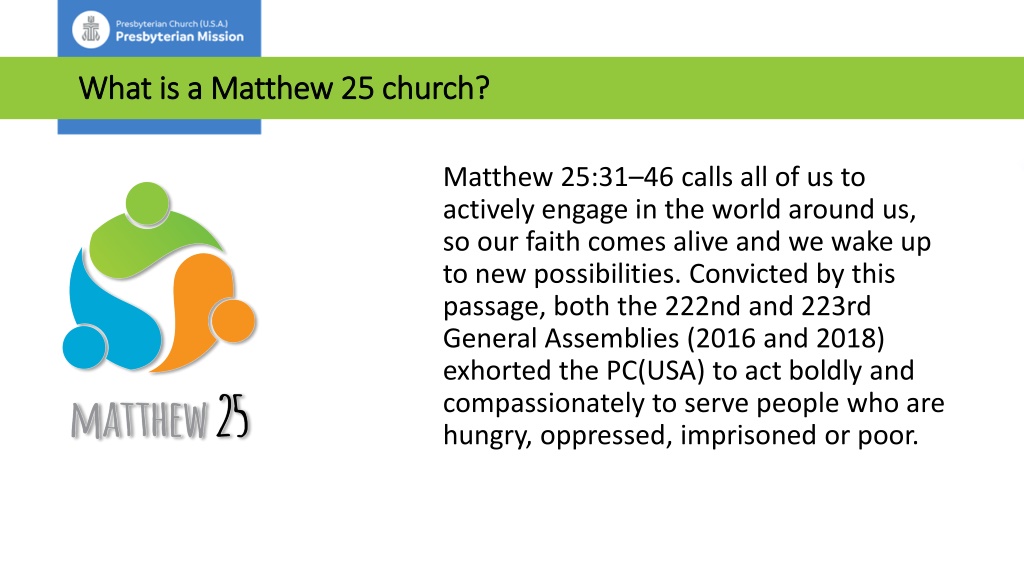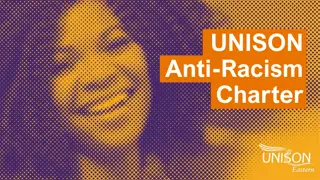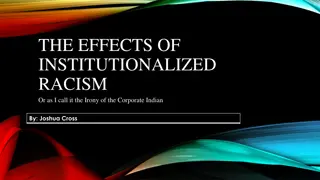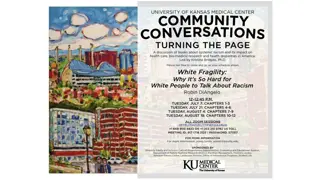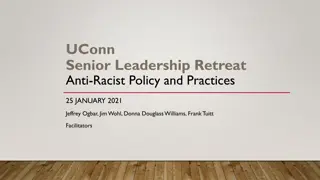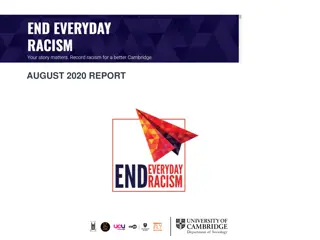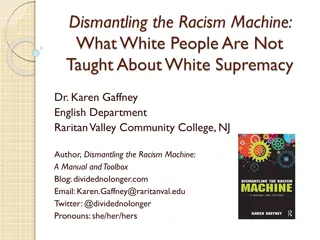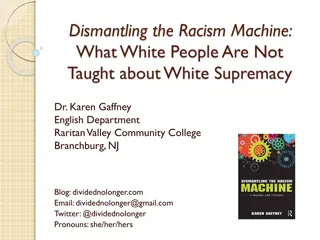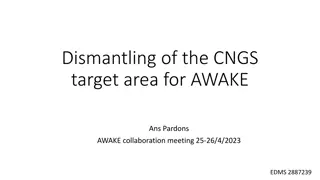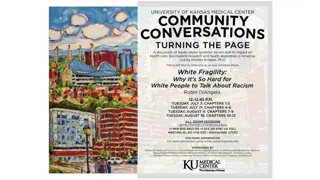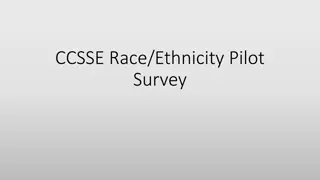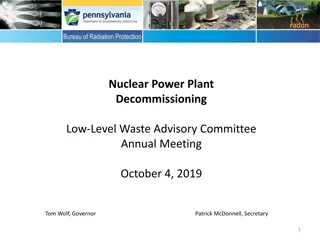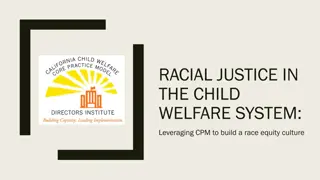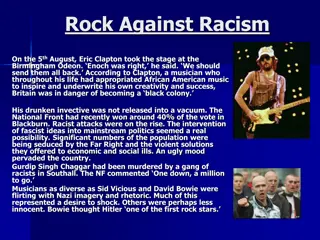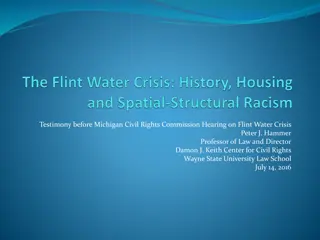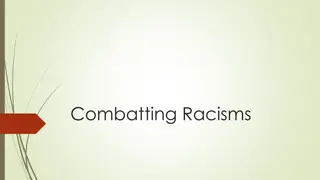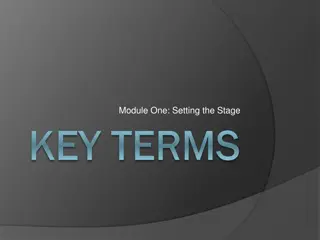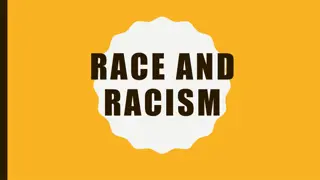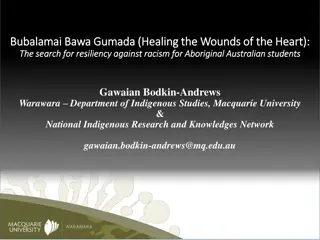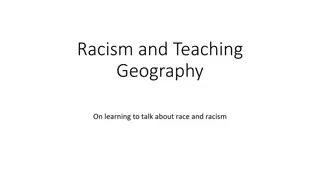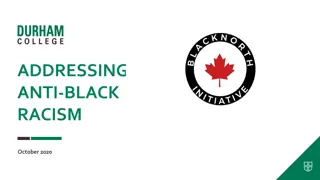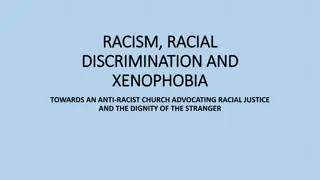Understanding the Concept of a Matthew 25 Church and Dismantling Structural Racism
Matthew 25:31-46 calls believers to actively engage in the world around them, focusing on congregational vitality, dismantling structural racism, and eradicating systemic poverty. This involves recognizing the systemic nature of racism, challenging social constructs that perpetuate inequality, and striving for justice and equity in the community. The Reformed Tradition acknowledges the impact of sin on relationships and emphasizes the need for solidarity and anti-racism efforts within the Church.
Download Presentation

Please find below an Image/Link to download the presentation.
The content on the website is provided AS IS for your information and personal use only. It may not be sold, licensed, or shared on other websites without obtaining consent from the author. Download presentation by click this link. If you encounter any issues during the download, it is possible that the publisher has removed the file from their server.
E N D
Presentation Transcript
What is a Matthew 25 church? What is a Matthew 25 church? Matthew 25:31 46 calls all of us to actively engage in the world around us, so our faith comes alive and we wake up to new possibilities. Convicted by this passage, both the 222nd and 223rd General Assemblies (2016 and 2018) exhorted the PC(USA) to act boldly and compassionately to serve people who are hungry, oppressed, imprisoned or poor.
Three Areas of Focus: Three Areas of Focus: Building Congregational Vitality Dismantling Structural Racism Eradicating Systemic Poverty
Dismantling Structural Racism Dismantling Structural Racism Racism is not primarily about individual prejudice or an individual s beliefs and attitudes. Rather, racism in the U.S. is a socially constructed system. Some people are advantaged, and others are disadvantaged, merely because of their skin color, ethnic identity or their ancestral background. Social power and prejudice have combined to treat people differently, whether intentionally or unintentionally. Some people are privileged while others are oppressed. As a consequence, there is unequal and inequitable access to resources such as money, education, information and decision-making power.
From From Facing Racism: A Vision of the Facing Racism: A Vision of the Intercultural Community Intercultural Community PC(U.S.A.) Churchwide Antiracism Policy While we each bear the indelible stamp of God s image, we recognize ourselves as fallen creatures who relate to others personally, socially, and institutionally in ways that deny that image in each other, and thereby violate the sacred bonds of community established by God. Sin and its effects continue to have consequences for relationships in the human community. The Reformed Tradition affirms that sin, resulting in distorted relationships and broken covenantal agreements, operates in corporate structures as well as interpersonal relationships.
| Structural | Systemic Individual | Institutional
Matthew 25 and Race: Assumptions Race as we know it did not exist for the 1st century Church or the Matthean community. Poverty, for our purposes, is defined as the lack of capital. The social construct of race is designed to concentrate capital (material and social) within one group or racialization of people over others.
A word about Matthew: The term translated righteousness (Greek dikaioi) is one form of a favorite term in Matthew, dikaiosyn (righteousness). Its meaning joins justice and mercy in a way reminiscent of the Hebrew term tsedaqah. It is no more than simple justice for those who have the ability to care for those who have need through acts of mercy. This term appears with such frequency in Matthew that it is sometimes referred to as the Gospel of Justice. - Belief: A Theological Commentary on the Bible - Matthew
The Judgment of the Nations Matthew 25:31-46 31 When the Son of Man comes in his glory, and all the angels with him, then he will sit on the throne of his glory.32All the nations will be gathered before him, and he will separate people one from another as a shepherd separates the sheep from the goats,33and he will put the sheep at his right hand and the goats at the left.34Then the king will say to those at his right hand, Come, you that are blessed by my Father, inherit the kingdom prepared for you from the foundation of the world;35for I was hungry and you gave me food, I was thirsty and you gave me something to drink, I was a stranger and you welcomed me,36I was naked and you gave me clothing, I was sick and you took care of me, I was in prison and you visited me. 37Then the righteous will answer him, Lord, when was it that we saw you hungry and gave you food, or thirsty and gave you something to drink?38And when was it that we saw you a stranger and welcomed you, or naked and gave you clothing? 39And when was it that we saw you sick or in prison and visited you? 40And the king will answer them, Truly I tell you, just as you did it to one of the least of these who are members of my family,*you did it to me.
The Judgment of the Nations Matthew 25:31-46 41Then he will say to those at his left hand, You that are accursed, depart from me into the eternal fire prepared for the devil and his angels;42for I was hungry and you gave me no food, I was thirsty and you gave me nothing to drink,43I was a stranger and you did not welcome me, naked and you did not give me clothing, sick and in prison and you did not visit me. 44Then they also will answer, Lord, when was it that we saw you hungry or thirsty or a stranger or naked or sick or in prison, and did not take care of you? 45Then he will answer them, Truly I tell you, just as you did not do it to one of the least of these, you did not do it to me. 46And these will go away into eternal punishment, but the righteous into eternal life.
222nd General Assembly Item 11-03: On Choosing to Be a Church Committed to the Gospel of Matthew 25 In the Parable of the Judgment of the Nations, Jesus tells a story about how he is encountered among the least the poorest, the most isolated, the imprisoned, the sick, and the hungry. We hear with sober conviction Jesus declaring that a church which fails to serve with and for the poor does not know Him. We agree with Pope Francis who stated that a church that is not actively supporting and serving the needs of the poor has no right to call itself church at all and should be prepared to give up its tax-exempt status to operate as a church. Let us be counted among the sheep who met their King as a stranger.
How can we move from talking to walking? Judgment of Nations Systems: 1. 1. Treatment of the hungry (access to land) Treatment of the hungry (access to land) 2. 2. Treatment of the thirsty (access to clean water) Treatment of the thirsty (access to clean water) 3. 3. Treatment of the stranger (new arrivals) Treatment of the stranger (new arrivals) 4. 4. Treatment of the naked (vulnerable persons) Treatment of the naked (vulnerable persons) 5. 5. Treatment of the sick (access to health care) Treatment of the sick (access to health care) 6. 6. Treatment of Prisoner (access to justice) Treatment of Prisoner (access to justice)
the least of my [siblings]... - Matthew 25:40 mikroi: little ones a term Jesus often uses in Matthew to refer to disciples. Least (elachistos) is the superlative.
Q2: What will it take for us to trust one another? Why we can t start at building trust : Common guidelines that have building trust at their base: Don t judge Don t make assumptions Assume good intentions Speak your truth Respect The underlying assumption is that these things can be universally applied. But because they do not account for unequal power relations, they do not function the same way across race or culture. The very conditions that the dominant culture insists on to remain comfortable are those that support the racial status quo, which is hostile to people of color.
Q2: What will it take for us to trust one another? Why we can t start at building trust : Trust seeks to create comfort To avoid discomfort is to avoid the work Trust is built as relationships are built Relationships are built by consistency and commitment to return to our missteps as well as our accomplishments
Q3: How can we truly journey together? What is behind our collective discomfort? What stops us in our tracks? For white people: Notions of good and bad are challenged. Lack of socialization (not knowing what to say). Sense of helplessness/white guilt. Defensiveness. Fear of retribution. Outrage. For people of color: Power imbalance/lack of structural power. Resistance when they do speak (having to validate their experiences). Fatigue. Re-traumatization (stress, weathering, physical and psychological erosion). Flattening. Previous disappointments.
Q3: How can we truly journey together? For white people: Consider one s own socialization. Listen to and focus on the message (not the messenger). Let go of any need to be good/right. Practice self-reflection. Process feelings and return to the situation. Build relationships (which then builds trust). For people of color: Practice self-care. Enlist allies when possible. Consider one s own participation in systems of white supremacy (particularly in relationship to other people of color). Be like Katie Cannon and Zora Neal Hurston.
